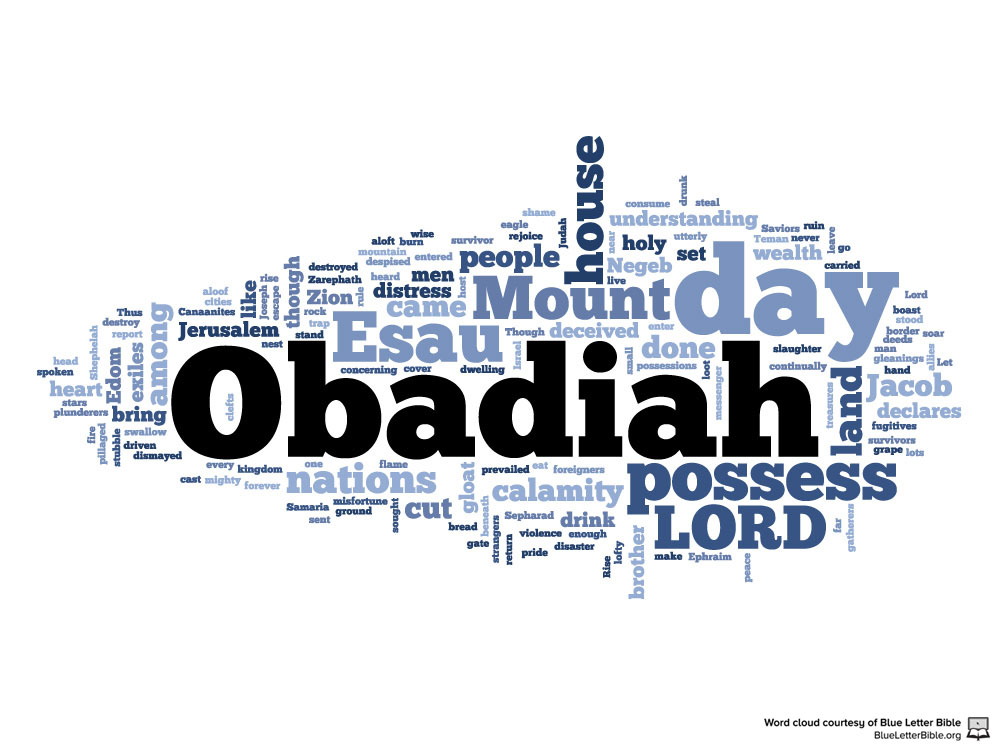Sermon for March 13 Vespers and video link for the Service
Click here for the link to the video for Vespers
2024-3-13 Obadiah
O Lord, let the words of my mouth and the meditation of my heart be acceptable to you, my Rock and my Redeemer. Amen.
In case you are wondering, Obadiah is indeed the shortest book in the Old Testament.
We know nothing about the person Obadiah, nor do we know exactly when the prophecy was spoken or written down. We surmise, based on its contents that it was written sometime between 587 BC – 555 BC. We can say with certainty that it cannot be any later than 553 BC for reasons I will get to shortly.
Obadiah is part of that group of 12 prophets that are called Minor Prophets because of the brevity of their message. The length of these 12 prophets pales in comparison to the tomes of Isaiah, Jeremiah, and Ezekiel. Well, length is not everything. What matters is the message, even if it is a “single issue” message such as Obadiah brings.
As is evident right away, the Lord uses the prophet Obadiah to address the sinful, selfish, short-sighted behavior of Edom and to hold them accountable. Edom is the name of a region that is located within the northern portion of the contemporary country of Jordan.
Edom has stirred the ire of God before, however, on this occasion it was what happened while Judah was overrun by the Babylonian army and the city of Jerusalem was being attacked and the walls torn down by the Babylonians. What they did here proved to be a bridge too far.
During the invasion and destruction, the Edomites did one of two things. Some Edomites captured those eluding and fleeing the destruction and then gave them to the Babylonians. We can safely assume that either money or favors of some kind were given in exchange for the prisoners. The other thing that Edomites were doing was essentially nothing. In their hour of need, other Edomites chose not to the come to the aid of Jerusalem through military means, nor did they render aid or material support to those who fled.
As we moved along in Obadiah, you observed that Obadiah moved between the names of Edom and Esau. From the context, we can tell that Obadiah means the same group of people. For example, in verse 1, the text says, “Thus says the Lord God concerning Edom…”. Then, in verse 6, it says “How Esau has been pillaged, his treasure sought out.” The reason for this back in forth is that Edomites are the descendants of Esau. You recall that Esau is the brother of Jacob. Their father is Isaac, and their grandfather is Abraham. Jacob and Esau are twin brothers and their relationship was contentious from the beginning. Jacob stole Esau’s birthright and inheritance.
Esau eventually went off and married a girl from a group of people that Isaac and Rebekah disapproved of. Edom was where they settled. The enmity between Jacob and Esau continued through the generations.
While there was plenty to complain about before, Edom’s behavior during the invasion of the Babylonians was a bridge too far. Edom remained unrepentant for either action or inaction. In fact, as Obadiah makes clear, Edom delighted in the misfortune of their distant family relations. They gloated over Jerusalem’s calamity.
Their behavior was such that God determined that a punishment, a divine punishment was warranted. Verse 15 says, “For the Day of the Lord is near on all nations. As you have done it shall be done to you; your deeds shall return on your own head.”
When you work your way through all the prophetic books, you encounter the phrase, “The Day of the Lord” or something similar like, “The Day of the anger of the Lord,” and “The Lord has a Day.” These phrases refer to a future, public, severe display of judgment that God will enact upon the sinner, not only on individuals, but also on sinful nations. The Day of the Lord is God’s discipline act work.
For those of us who witness God’s act of discipline, this is a fine time for self-reflection and examination, that ought to lead to repentance, so that God’s mercy remains before us, rather than His wrath.
Edom did not have to wait long for the Day of the Lord to arrive. A short time ago I said that Obadiah could not be written any later than 553 BC. The reason for this is that the last ruler of Babylon, Nabonius, led a military campaign against Edom in 553. If all the Edomites were not killed in the fighting, their ranks were severly decimated. So much so that after Cyrus and the Persians conquered Babylon in 539 BC, there really is longer reference to Edom as a distinctive people. They are gone. They disappear from history. Such is the finality of the Day of the Lord.
Obadiah is a fiery little book. It’s 21 verses are easy to pass over. Also easy for us to not discern any good news in it.
At the conclusion of its introduction to Obadiah, the Lutheran Study Bible offers these thoughts under the heading of Blessings for Readers. “Little Obadiah would be easy to overlook. However, carefully consider how this short prophecy is emblematic for all the OT prophetic books, emphasizing the Lord’s reign on behalf of His people, which He would extend to other nations. This theme anticipated the coming of Jesus, whose merciful rule creates the Church, which now encircles the globe.”
God acted on behalf of God’s people then, He continues to act on behalf of His people now.
… The peace of God which passes all understanding keep your hearts and minds in Christ Jesus. Amen.

Comments
Post a Comment